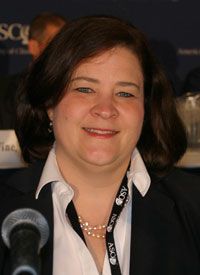Advanced Thyroid Cancer Responds Well to Targeted Therapies
The kinase inhibitors sorafenib (Nexavar) and lenvatinib (Lenvima) have significantly altered the treatment paradigm for patients with advanced radioactive iodine (RAI)-refractory differentiated thyroid cancer in both older and younger populations, with combination strategies hoping to further build upon this success.
Advanced Thyroid Cancer

Marcia Brose, MD
The treatment paradigm for advanced radioactive iodine (RAI)-refractory differentiated thyroid cancer (DTC) in all ages has been greatly changed due to kinase inhibitors sorafenib (Nexavar) and lenvatinib (Lenvima), with combination strategies hoping to further build upon this success, Marcia Brose, MD, told physicians at the 33rd Annual Chemotherapy Foundation Symposium.
Over 65,000 new cases of DTC and 2000 deaths are expected this year, said Brose, director of the Thyroid Cancer Therapeutics Program at the University of Pennsylvania. In 5% to 15% of patients, the disease becomes RAI-refractory, with median survival estimated at 2.5 to 3.5 years.
Prior to sorafenib becoming the first kinase inhibitor approved for RAI-refractory DTC in 2013, the ineffecitve chemotherapy doxorubicin was the standard, Brose said, with the pivotal phase III DECISION trial being the first successful analysis of a kinase inhibitor in this setting.
“Here we had patients with definite evidence of progression, as well as evidence of RAI-refractory [DTC] either because the disease did not take up radioactive iodine or because the disease took up radioactive iodine and grew anyway,” Brose said.
In the study, 417 patients were randomized in a 1:1 ratio to sorafenib or placebo, and crossover was allowed at the time of progression, with the primary endpoint of progression-free survival (PFS). The sorafenib cohort had a PFS of 10.8 months; whereas, PFS for the placebo group was 5.8 months (HR, 0.587; 95% CI, 0.4540.758;P<.0001).
In 2015, the multikinase inhibitor lenvatinib joined sorafenib as an approved therapy for patients with RAI-refractory DTC. This agent demonstrated value for patients with progression on prior sorafenib, Brose said.
In the phase III SELECT study, patients were randomized in a 2:1 ratio to lenvatinib or placebo. A portion of these patients had received prior VEGF/VEGFR-targeted therapy, providing hints at an optimal sequence for these therapies.
In the full population, lenvatinib achieved an 18.3-month PFS versus 3.6 months for placebo. “This is clearly a different population than the DECISION trial, with patients more rapidly progressing,” Brose said.
“In the second-line, we also had a very good PFS, at 15.1 months. Now, it’s been argued by some that because it’s active in the second-line that lenvatinib can be used in the first- or second-line after sorafenib, whereas others argue lenvatinib is suitable for first-line treatment only,” Brose said. “I think both are true, and I think it’s just very good for our patients that we now have two lines of therapy.”
Further data from the SELECT trial indicated that patients over 65 years did well, achieving 16.7-month PFS versus 20.2 months for the younger group. The risk of death in this group was reduced by 47% with lenvatinib (HR, 0.53; CI, 95%, 0.31-0.91), marking this as the first survival benefit for older patients with DTC.
“What really caught our eye is that treatment with lenvatinib improved their overall survival to that actually comparable or at least within range of the patients who are under 65,” Brose said.
To further build upon these results, the phase II UPCC 19309 trial gave patients with metastatic DTC who were progressing despite prior therapy with sorafenib a combination of sorafenib and everolimus (Afinitor). PFS was the primary endpoint of the study.
The median PFS with the combination was 13.9 months (95% CI, 7.15-24.75). There was 1 partial response among the 33 evaluable patients enrolled in the study (3%). Additionally, 18 patients had stable disease for ≥6 months, for a clinical benefit rate of 58%.
These findings were surprising, since an earlier study exploring the combination had caused toxicity, for a reason that is not yet understood, said Brose. Further analysis of data from this study showed patients with PFS over 40 months, she added. Given the level of efficacy seen, further clinical trials are planned to confirm the results.
Anticipating Novel Options for the RAI-Refractory DTC Armamentarium
May 15th 2023In season 4, episode 6 of Targeted Talks, Warren Swegal, MD, takes a multidisciplinary look at the RAI-refractory differentiated thyroid cancer treatment landscape, including the research behind 2 promising systemic therapy options.
Listen